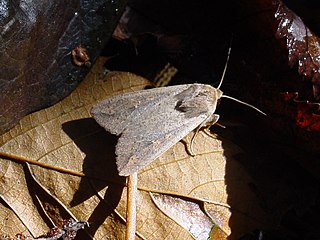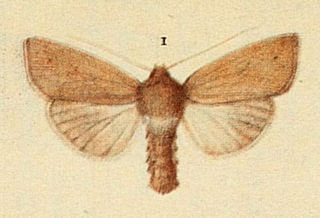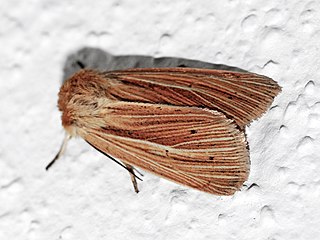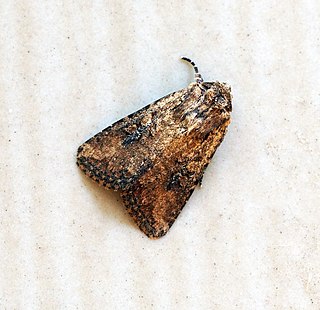
Mythimna ferrago, the clay, is a moth of the family Noctuidae. The species was first described by Johan Christian Fabricius in 1787. It is distributed throughout Europe and is also found in Morocco, Algeria, Turkey, Asia Minor, Armenia, Syria, Turkestan, Israel, Lebanon, Iraq, Iran, Central Asia and the western parts of temperate North Asia. Also Tibet.

Mythimna impura, the smoky wainscot, is a moth of the family Noctuidae. The species was first described by Jacob Hübner in 1808. It is distributed throughout most of the Palearctic realm from Ireland in the west of Europe east to the Caucasus, Turkey, Syria, Kazakhstan, Russia, Siberia, Mongolia, then Japan. In Europe it is found from the Arctic Circle to Spain and Italy in the south, as well as in the northern regions of Greece.

Mythimna pallens, the common wainscot, is a moth of the family Noctuidae distributed throughout the Palearctic realm from Ireland in the west, through Europe to Central Asia and Amur to the Kuriles in the east. The species was first described by Carl Linnaeus in his 1758 10th edition of Systema Naturae.

Mythimna is a genus of moths in the family Noctuidae described by Ferdinand Ochsenheimer in 1816.

Mythimna albipuncta, the white-point, is a moth of the family Noctuidae. The species was first described by Michael Denis and Ignaz Schiffermüller in 1775. It is distributed throughout Europe and one subspecies is found in Tunisia. It is also found in Asia Minor, Armenia, and Iran, and the northeastern United States.

Mythimna unipuncta, the true armyworm moth, white-speck moth, common armyworm or rice armyworm, is a nocturnal agricultural pest belonging to the family Noctuidae. This moth is also commonly referred to by the scientific name Pseudaletia unipuncta. The species was first described by Adrian Hardy Haworth in 1809. Mythimna unipuncta is found in the Americas and in parts of Europe, Africa and Asia. Its original distribution is North and South America. It has been introduced to other places from there. They are known as armyworms because the caterpillars move in lines as a massive group, like an army, from field to field, damaging crops.

Mythimna vitellina, the delicate, is a moth of the family Noctuidae. The species was first described by Jacob Hübner in 1808. It is mainly distributed throughout southern Europe and the southern part of eastern Europe. It is also found far less commonly further north in Europe. Also in North Africa, the Near East and Middle East, Central Asia and western China.

Mythimna straminea, the southern wainscot, is a moth of the family Noctuidae. The species was first described by Georg Friedrich Treitschke in 1825. It is found in the western parts of the Palearctic realm, including Morocco, Europe, Turkey, the Caucasus, Israel, and Lebanon.

Mythimna separata, the northern armyworm, oriental armyworm or rice ear-cutting caterpillar, is a moth of the family Noctuidae. It is found in China, Japan, South-east Asia, India, eastern Australia, New Zealand, and some Pacific islands. It is one of the major pests of maize in Asia. The species was first described by Francis Walker in 1865.

Mythimna turca, the double line, is a moth of the family Noctuidae. The species was first described by Carl Linnaeus in 1761. It is found in Europe. The eastern expansion extends through northern Asia and central Asia to northern China, Korea and Japan. It rises to a height of about 700 metres in the Alps.

Mythimna conigera, the brown-line bright-eye, is a moth of the family Noctuidae.

Mythimna favicolor, or Mathew's wainscot, is a moth of the family Noctuidae. The species was first described by Charles Golding Barrett in 1896. It is found in Europe. The species is sometimes treated as a subspecies of Mythimna pallens, the common wainscot.

Mythimna congrua is a species of moth of the family Noctuidae.

Mythimna languida is a species of moth of the family Noctuidae. It is found in almost all parts of tropical and subtropical Africa, Asia and the Mediterranean basin.

Mythimna sicula is a species of moth of the family Noctuidae. It is found from Morocco to Libya, central and southern Europe, Turkey, Israel, Iran and Turkmenistan.
Mythimna alopecuri is a species of moth of the family Noctuidae. It is found in southern Europe, Turkey, the Caucasus region, Israel, Jordan, Iraq, Iran, the European part of southern Russia, Ukraine, Kazakhstan and Turkmenistan.

Leucania loreyi, the cosmopolitan, false army worm or nightfeeding rice armyworm, is a moth of the family Noctuidae. It is found in most of African countries, the Indo-Australian subtropics and tropics of India, Sri Lanka, Myanmar, the eastern Palearctic realm, and the Near East and Middle East. The species was first described by Philogène Auguste Joseph Duponchel in 1827.
Mythimna scottii is a moth of the family Noctuidae. It has been recorded from Australia, Fiji, New Caledonia and Hawaii. But it has been listed as a Species inquirenda and might prove to be a synonym.

Mythimna anderreggii is a moth in the family Noctuidae. It is found in the mountains of Europe. It is also present in the northern Caucasus, the Gissar Range, the Pamir mountains and the Tian Shan mountains.

Mythimna oxygala, the lesser wainscot, is a species of cutworm or dart moth in the family Noctuidae.

















